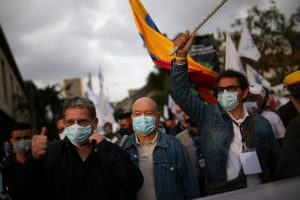By: Alejandra De La Camara, 2L
Victims of the longest-running war in the Americas are in the process of providing testimony against perpetrators in a historic new court, Colombia’s Special Jurisdiction for Peace (JEP). Established in 2016 following the end of the country’s civil war, the Court had not yet attributed criminal responsibility to former leaders of the Revolutionary Armed Forces of Colombia (FARC). Its first criminal accusations came in January, issuing indictments against commanders of the FARC fighters for war crimes and crimes against humanity. While these indictments hold the promise of peace and restoration for Colombian citizens, skeptics await the ultimate outcome.
The JEP was the result of a peace deal between the government and the FARC after five decades of war. The conflict evolved from the launch of the FARC’s insurgency in the 1960s to a battle involving guerilla groups, paramilitaries, the military, and cartels that devastated Colombia. During its course, the war took as many as 220,000 lives, resulted in 25,000 disappeared, and led to 5.7 million displaced people. The peace agreement stipulated an end to the FARC’s terrorization in return for a “transitional justice system” which would grant soldiers amnesty or reduced sentences for their crimes.
The court was created to satisfy victims’ rights to justice by offering them truth and contributing to their reparation, with the purpose of building a stable and lasting peace. Achieving justice through the JEP, however, produces more lenient outcomes than most justice systems. Once indicted, the accused can admit guilt and face non-prison sentences which could mean up to eight years digging out land mines or tracking down bodies. If they choose not to admit guilt, they face trial and the possibility of a decades-long sentence.
Many criticized the approach as a method of placating the international community rather than providing real justice for the guerilla’s victims. Ultimately, however, Colombians voted to ratify the peace deal. Colombians largely welcomed the opportunity for peace, albeit far from perfect, after a generation of turmoil. Since January, JEP has uncovered devastating information about victim counts and has issued decisive indictments critics did not anticipate. Those indicted in January have until April to respond to the court. The court’s response following their answer, whether guilty or not, will set the tone for the rest of the justice process, instilling either confidence or distrust in the system.





